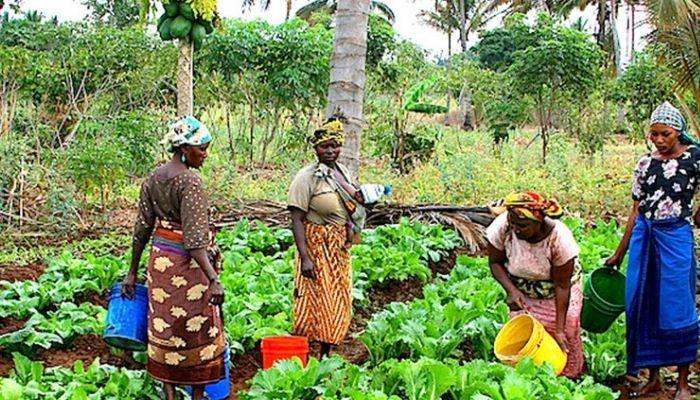Women on the frontlines of climate change in Nigeria say their struggles and solutions remain absent from global climate negotiations, even as world leaders and diplomats convene at COP30 in Belém, Brazil.
The 2025 United Nations Climate Change Conference (COP30), the 30th session of the Conference of the Parties to the UNFCCC, took place from Nov. 10 to 21 at the Hangar Convention Centre in Belém. The annual summit is where nations negotiate actions to limit global warming to 1.5°C, support vulnerable communities adapting to climate impacts, and advance efforts toward net-zero emissions by 2050.
Mrs Olanike Olugboji-Daramola, Founder and Executive Director of the Women Initiative for Sustainable Environment (WISE), said her organization has spent more than 20 years promoting environmental sustainability and empowering women and girls as natural resource managers, climate actors and peace builders.
Speaking on Saturday during a farm visit and smallholder farmers’ dialogue organized by WISE in Kaduna, Olugboji-Daramola lamented that those most affected by climate change are rarely represented at major global negotiations.
She described it as troubling that many rural women farmers—whose livelihoods are disrupted by extreme weather and environmental degradation—are unaware that high-level climate meetings affecting their futures take place every year.
Olugboji-Daramola said COP30 should have been a platform for grassroots women to speak for themselves, but the process “has been hijacked by big players and big corporations.”
According to her, the spaces have become a “jamboree” for people with no connection to grassroots realities, while women facing crop failure, poor yields, land loss and livelihood threats remain excluded.
She said WISE is therefore creating local platforms where women can understand global processes, articulate their challenges and shift from focusing on burdens to showcasing their expertise and leadership.
The environmental activist highlighted ongoing initiatives, including the WISE Regenerative Agriculture Accelerator, which supports women farmers in adopting organic, biodiversity-promoting practices. She also noted that the organizations Clean Cooking Training and Entrepreneurship Project has produced more than 2,000 clean-cooking entrepreneurs across Nigeria, including one participant who is now a leading producer of energy-efficient cook stoves.
Also speaking, Ms Joanne Kuria of the Association of Women’s Rights in Development (AWID), Kenya, said she was in Nigeria to collaborate with WISE on creating people-centred climate spaces outside the formal COP structure.
Kuria said that while negotiations were happening in Brazil, the real climate stories were unfolding in African communities, where women farmers face harsher temperatures, erratic rainfall, deforestation and shrinking farmlands.
She said the experiences shared in Kaduna mirrored those in Kenya, noting that African women continue to suffer the same climate stresses and the same barriers to land ownership and decision-making.
Kuria called for stronger collective solidarity among African women to ensure the continent speaks with one voice at global climate platforms and that gendered climate impacts are reflected in international decisions.
Rural women farmers at the gathering also expressed frustration at being excluded from global climate discussions.
Mrs Asibi Hassan, Chairperson of the Sabon Gari Peace Women Multipurpose Cooperative Society, said thieves carted away her entire harvest of beans this year, despite cultivating one hectare and expecting seven to ten bags.
She said if given the chance to attend COP30, she would raise issues of insecurity, land rights and the multiple burdens rural women carry to sustain food production.
Hassan said women remain systematically denied access to large farmlands, despite their capability and hard work, and that cultural and structural barriers worsen their struggles.
She noted that mechanized farming could significantly improve women’s productivity, but access to such support remains limited. She added that late rainfall and early cessation during the year reduced crop yields drastically.
Hassan urged the government to partner with grassroots NGOs to equip rural women with climate adaptation strategies. She also called for the revival of monthly sanitation exercises to clear waterways and for stricter action against individuals who build on water channels.
Another farmer, Mrs Juliana Turaki, leader of the Gonin Gora Women Multipurpose Cooperative Society, said she would use a COP platform to insist that the experiences of rural women be prioritized in global climate agreements.
She said women often struggle to access farmlands, as men are given priority, while inheritance practices overwhelmingly favor male children.
Turaki said recognizing women as full agricultural actors and granting them fair access to land—whether through inheritance or ownership—would reduce hardship and strengthen food security in rural communities battling climate change.
Other women at the dialogue said the stories shared in Kaduna demonstrate the urgent need to rethink climate representation and ensure that global decisions reflect the realities of those facing climate shocks directly.
They stressed that while leaders negotiate in Brazil, true climate justice requires amplifying the voices of grassroots women farmers and ensuring they are not left behind in shaping local and global climate solutions.


